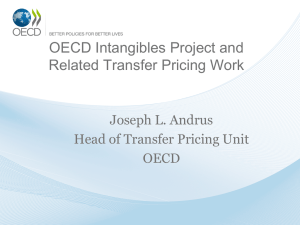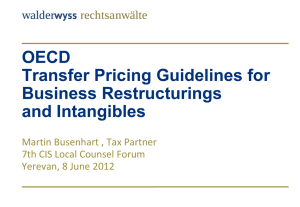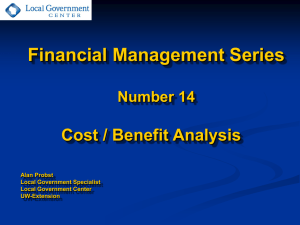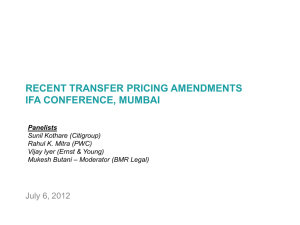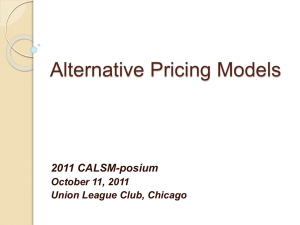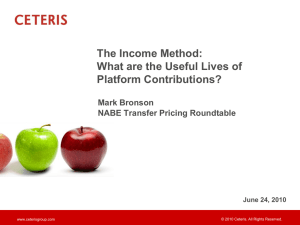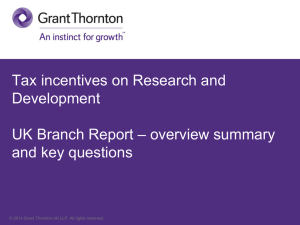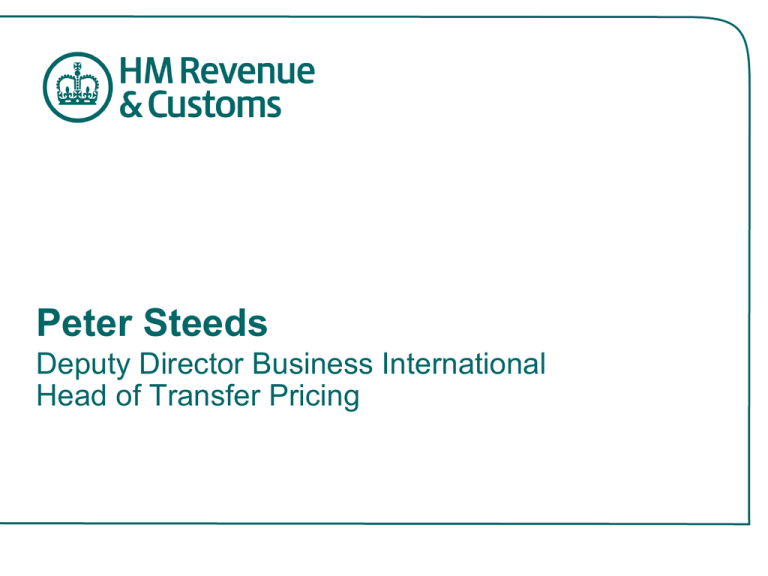
Peter Steeds
Deputy Director Business International
Head of Transfer Pricing
Transfer Pricing Landscape
•
Relationship between HMRC and large business
•
Dispute resolution
•
The future of the arm’s length standard
•
An expanding market
Transfer Pricing Group
•
Initiated in response to the Links with Business
report
•
•
•
•
Dedicated resources
Strong governance
Aim to resolve legacy cases,
Aim to improve selection, working and resolution
of new cases
Dispute resolution
What it should do:
•
deliver certainty
•
relieve double taxation
•
in accordance with treaties
•
do it quickly
•
and cost effectively
Competent Authority Issues
•
More APA business
•
Ways to deliver quicker resolution
•
Effective Arbitration
•
Business access to the process
OECD Working Party 6
•
Intangibles
•
Simplification
•
Global Forum
•
UN Manual for Developing Countries
Expanding market
•
Mostly unchanged – US, France, Germany,
Japan
•
New MAP and APA treaty partners
•
BRICs countries
Contact Details
Peter Steeds
Deputy Director Business International, Head of Transfer Pricing
HMRC
100 Parliament Street
London
SW1A 2BQ
Telephone: 020 7147 3916
E-mail: peter.steeds@hmrc.gsi.gov.uk
International Fiscal Association
Transfer Pricing of Intangibles
Wendy Nicholls
Partner - Head of Transfer Pricing
8th November 2012
What is the news saying about transfer pricing …
Starbucks tax bill stirs transfer pricing spat
"Anger over how Starbucks reportedly paid just £8.6m in taxes on £3bn+ UK income
since 1998 has re-ignited debate about multinationals’ transfer pricing transactions."
Apple paid less than 2% tax on overseas profits - despite
£23bn earnings
"Apple paid less than 2% tax on its overseas profits, documents revealed today, after the iPad
and iPhone giant slashed the amount foreign taxmen receive."
Facebook's UK corporation tax bill last year was less than
it pays a single average worker
"This involved a transfer pricing game, using Ireland as the offshore bolthole. It illustrates
among other things that when people talk about Ireland’s headline corporation tax rate of
12.5%, this is easy to misunderstand."
© 2012 Grant Thornton UK LLP. All rights reserved.
Discussion draft on Intangibles (OECD)
“Working Party No. 6 delegates are uniformly of the view that transfer
pricing outcomes in cases involving intangibles should reflect the
functions performed, assets used, and risks assumed by the parties.
This suggests that neither legal ownership, nor the bearing of costs
related to intangible development, taken separately or together, entitles
an entity within an MNE group to retain the benefits or returns with
respect to intangibles without more.”
© 2012 Grant Thornton UK LLP. All rights reserved.
Why are intangibles important for transfer pricing?
"Recognition that the most difficult business restructuring issues involve
intangibles, where guidance is inadequate"
Joe Andrus - OECD, Head of Transfer Pricing
•
Increasing profits of MNEs (multinational enterprises) are being driven by
intangibles ('make and sell' gives way to 'technology' and 'brand').
•
Groups have 'globalised' and centralised.
•
The ownership and control of intangibles are mobile:
– tax competition
– concerns over 'base erosion'.
© 2012 Grant Thornton UK LLP. All rights reserved.
What do we mean by intangibles
Proposed definition:
1) Something which is not a physical asset or a financial
asset; and
2) Which is capable of being owned or controlled for use in
commercial activities.
(paragraph 5 Discussion Draft)
© 2012 Grant Thornton UK LLP. All rights reserved.
Recent cases
• Recent cases have highlighted the difficulties, especially
with 'marketing intangibles' and royalties.
• For example:
– Maruti-Suzuki - "bright line" test
– Glaxo Canada - separate transactions vs. entirety of
arrangements/provisions.
© 2012 Grant Thornton UK LLP. All rights reserved.
What is 'out' and what is 'in' …
Out: Old distinctions:
–
–
–
–
hard vs. soft
routine vs. non routine
marketing vs. trade
economic ownership vs. legal ownership.
In: New definitions:
– 'unique and valuable'
– 'entitlement to Intangible Related Returns'
– 'IRRs' are 'economic returns after deducting costs and expenses and returns
to other business functions assets and risks'
– 'important functions' ('SPFs'?).
© 2012 Grant Thornton UK LLP. All rights reserved.
Good news (so far)
• Confirmation that group synergies, workforce in place and
market specific characteristics are not intangibles per se, but
comparability factors.
• Explicit acknowledgement that not all intangibles give rise to
'super profits'.
• Re-characterisation is allowed in extreme cases only (at least
in the text).
• Hindsight is discouraged (again at least in the text).
© 2012 Grant Thornton UK LLP. All rights reserved.
Development needs
• Loose definitions e.g. 'IRR' and confusing/incorrect examples
• Anti abuse tone e.g. re-characterisation examples and
'conduct trumps contract' assumptions
• Functions and control over functions promoted above assets
and risks
• Legal contracts, accounting, meeting costs and purchase price
allocations (inter alia) are too swiftly dismissed
• 'Options realistically available' need to be analysed - how far?
how many options?
• Potential default to residual profit split methods.
© 2012 Grant Thornton UK LLP. All rights reserved.
What's next?...
• Public consultation in Paris 12th-14th November 2012.
• Back to the drafting for Working Party 6 delegates. Final
report due by end of 2013.
• Meanwhile various countries making up their own rules
leading to more potential disputes and more double
taxation?
© 2012 Grant Thornton UK LLP. All rights reserved.
Resolving and avoiding disputes
Erica Hogg
Johnson Controls Ltd
© 2012 Grant Thornton UK LLP. All rights reserved.

